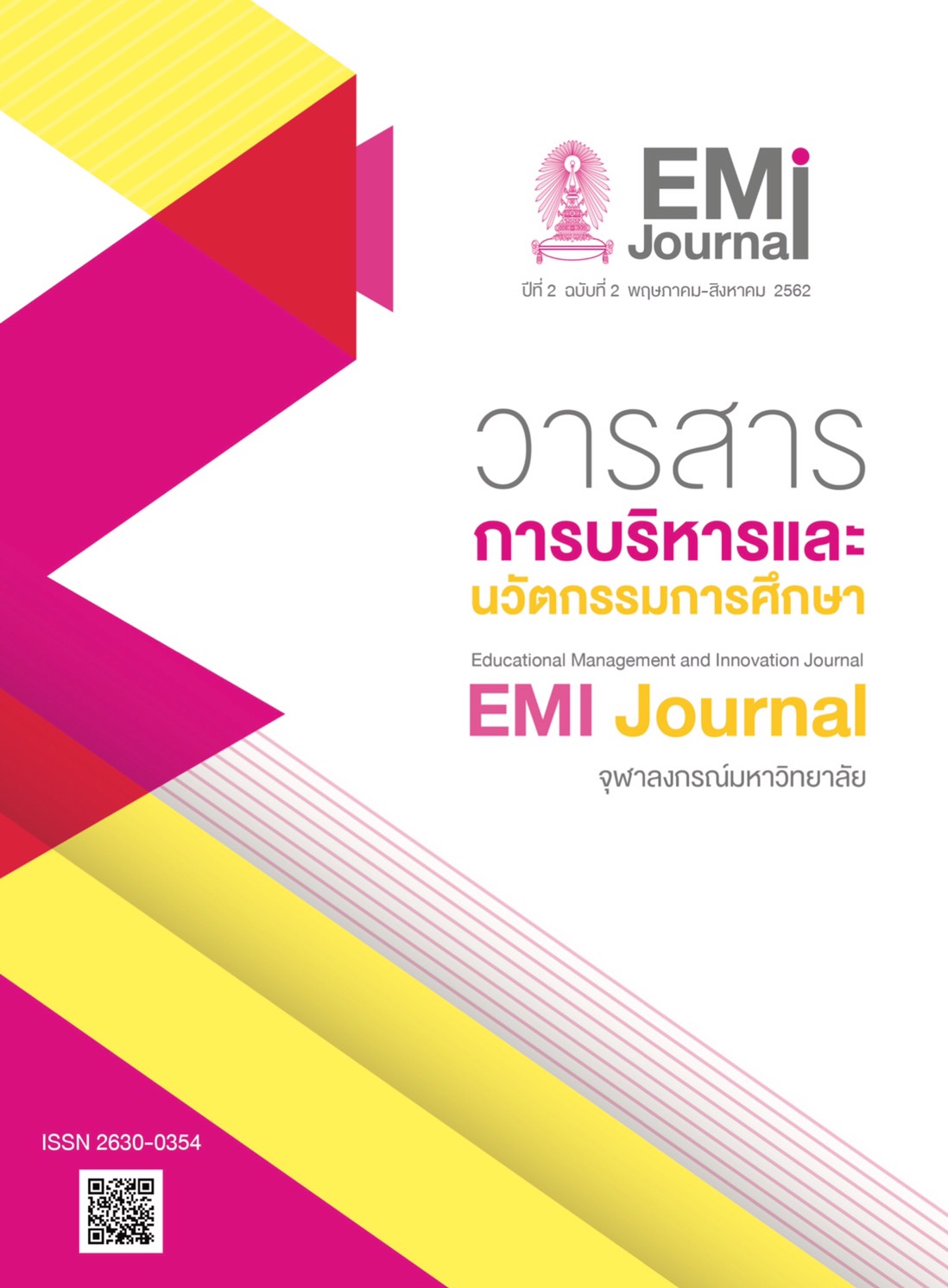PRINCIPALS’ TRANSFORMATIONAL LEADERSHIP STYLE AND ORGANIZATIONAL COMMITMENT OF THE TEACHERS’ IN MIDDLE SECONDARY SCHOOLS OF BHUTAN
คำสำคัญ:
TTransformational Leadership, Organizational Commitment, Middle Secondary Schoolบทคัดย่อ
The study was aimed at answering the three important research questions: What is the level of principals’ transformational leadership behavior as perceived by teachers? To what extend are Bhutanese middle secondary school principals’ engaged within the four dimensions of transformational leadership? Is there any relationship between principals’ transformational leadership behavior and organizational commitment of the teachers? The samples of 236 teachers were selected through simple random sampling method, and self- administered survey questionnaire was deployed to collect data. The result showed that the level of principals’ transformational leadership behavior as perceived by teachers at a high level and their engagement in four dimensions of transformational leadership behavior were also shown at a high level. It was found that there was also a positive correlation between principals’ transformational leadership behavior and organizational commitment of teachers in the middle secondary schools of Bhutan.
Downloads
เอกสารอ้างอิง
Bass, B. M. (1999). Two decades of research and development in transformational leadership. European Journal of Work and Organizational Psychology, 8, 1, 9-32.
Bass, B. M., & Riggio, R. E. (2006). Transformational leadership (2nd ed.). Mahwah, NJ: Lawrence Erlbaum Associates.
Bass, B.M. (1985). Leadership and performance beyond expectations. New York: Free Press.
Bello, S. M. (2012). Impact of ethical leadership on employee job performance. International Journal of Business and Social Science, 3 (11), 228-236.
Best, John W. and Kahn, James V. (1998). Research in education (8th ed.). Boston: Allyn and Bacon.
Burns, J. M. (1978). Leadership. New York: Harper & Row.
Chirchir, R. K., Kemboi, A., Kirui, W., Ngeno, V. (2014). Leadership style and Teachers commitment in public primary schools in Bomet County, Kenya. Journal of Education and Practice, 5, (39), 175-183.
DuBrin, A.J.[2010]. Principles of Leadership (6th Edition). Canada: South-Western, Cengage Learning.
Feizi, M., Ebrahim. E., & Beheshti, N. (2014). Investigating the relationship between transformational leadership and organizational commitment of high school teachers in Germi. International Journal of Organizational leadership, 3, 17-30.
Geib, P., & Swenson, J. (2013). China: Transformational Leadership for Policy and Product Innovation. Advances in Management, 6(5), 3-10.
Javdani, M. (2011). Examination of the relationship between transformational/ transactional leadership and organizational commitment of teachers, foundations of Education. Research Bulletin of Ferdowsi University (FUM), 1(1), 143–158.
Imo, E.U., & Ekpenyong, A. M. (2018). Principals’ transformational leadership practices as determinants of organizational commitment and value reorientation among secondary school teachers. International Journal of Education, Learning and Development , 6(2), 26-40.
Krejcie, R.V., & Morgan, D.W. (1970). Determining sample size for research activities. Educational and psychological measurement, 30,607-610.
Lee, J. (2005). Effects of leadership and leader-member exchange on commitment. Leadership & Organization Development Journal, 26(8), 655 - 672.
Leedy, P.D. (1993). Practical research: Planning and design. New Jersey: Prentice-Hall.
Leithwood, K., Jantzi, D., & Steinbach, R. (1999). Changing leadership for changing times. Buckingham, UK: Open University Press.
Marzano, R.J., Waters, T., & McNulty, B.A. (2005). School Leadership that works: From research to results. Alexandria, VA: Association for supervision and curriculum development.
Meyer, J. & Allen, N. (1991). A three-component conceptualization of organizational commitment, Human Resource Management Review, 1(1), 61-89.
Ministry of education, Bhutan. (2017). National Education Statistics, Thimphu. Bhutan: Thimphu.
Omidifar, R. (2013) Leadership style, organizational commitment and job satisfaction: A case study on high school principals in Tehran, Iran. American Journal of Humanities and Social Sciences, Vol. 1(4), 263-267.
Raman, A., Mey, C. H., Don, Y. Daud, Y., & Khalid, R. (2015). Relationship between principals’ transformational leadership style and secondary school teachers’ commitment. Asian Social Science, 11(15), 221-228.
Rehman, U. A., Shareef, A., Mahmood, A., Ishaque, A. (2012) Perceived leadership styles and organizational commitment, Interdisciplinary Journal of Contemporary Research in Business, Vol. 4(1), 616-626.
Reyes, P., & Pounder, D.G. (1993). Organizational orientation in public and private elementary schools. The Journal of Educational Research, 87, 86-93.
Robbins, P. (2003). Organizational behavior: Global and South African perspective. Englewood Cliffs: Prentice Hall.
Simola, S., Barling, J., & Turner, N. (2012). Transformational Leadership and Leaders’ Mode of Care Reasoning. Journal of Business Ethics, 108, 229–237.
Tshewang. (2013).Principal’s transformational behavior and teachers’ job satisfaction of secondary school teachers under Chukha district, Bhutan. M.Ed Thesis,. Mahidol University, Thailand.
Wallace, J. E. (1995). Organizational and professional commitment in professional and nonprofessional organizations. Administrative Science Quarterly, 40, 228-255.
Wu, T.F., Tsai, M.H., Fey, Y. H., Wu, R. T.Y. (2006). A Study of the relationship between manager’s leadership style and organizational commitment in Taiwan’s International Tourist Hotels. Asian Journal of Management and Humanity Sciences, 1(3), 434-452.
Yu, H., Leithwood, K., & Jantzi, D. (2002). The effects of transformational leadership on teachers' commitment to change in Hong Kong. Journal of Educational Administration, 40(4), 368–389.
Yukl, G. (1998). Leadership in organization. Englewood cliffs.



